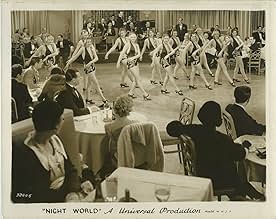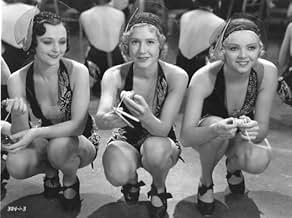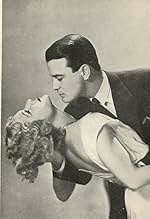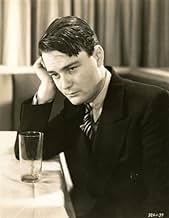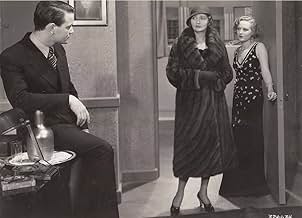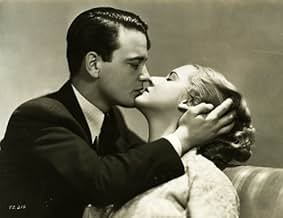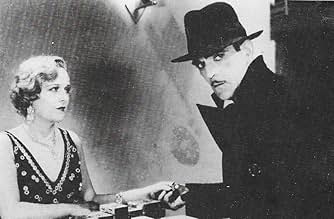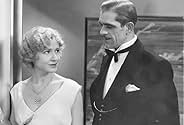Story of the goings-on at a Prohibition-era nightclub.Story of the goings-on at a Prohibition-era nightclub.Story of the goings-on at a Prohibition-era nightclub.
- Director
- Writers
- Stars
Alice Adair
- Chorine
- (uncredited)
Consuelo Baker
- Chorus Girl
- (uncredited)
Frank Beal
- Bit
- (uncredited)
Louise Beavers
- Maid
- (uncredited)
- Director
- Writers
- All cast & crew
- Production, box office & more at IMDbPro
Featured reviews
You can certainly tell that "Night World" is a pre-code picture. It's set in a speakeasy--just the sort of sordid locale that wouldn't have been allowed after the new Production Code went into effect in mid-1934. Of course, by then alcohol was legal and speakeasies were a thing of the past anyways. The film is very much like a soap opera--with a variety of folks and love affairs going on during the course of the picture.
Several story lines are going on at the same time in this film and at then end, they all converge. One story is about the owners of the club, Happy (Boris Karloff) and Jill. However, Jill is cheating on her hubby and the way this story ends is pure dynamite. The main story involves a young man who's been drinking himself into oblivion (Lew Ayres). Why and his relationship with a girl who works in the club (Mae Clark) is fascinating. Finally, the doorman (Clarence Muse) has something going on with his sick wife. Again, all three stories converge at the end for a very slick and tense finale.
I rarely give short films like this such high scores. However, with this one, the writing was so good and the ending so enjoyable I highly recommend it. Thrilling and enjoyable throughout.
By the way, the dance numbers, though smaller in scale than his trademark choreography, were directed by Busby Berkeley.
Several story lines are going on at the same time in this film and at then end, they all converge. One story is about the owners of the club, Happy (Boris Karloff) and Jill. However, Jill is cheating on her hubby and the way this story ends is pure dynamite. The main story involves a young man who's been drinking himself into oblivion (Lew Ayres). Why and his relationship with a girl who works in the club (Mae Clark) is fascinating. Finally, the doorman (Clarence Muse) has something going on with his sick wife. Again, all three stories converge at the end for a very slick and tense finale.
I rarely give short films like this such high scores. However, with this one, the writing was so good and the ending so enjoyable I highly recommend it. Thrilling and enjoyable throughout.
By the way, the dance numbers, though smaller in scale than his trademark choreography, were directed by Busby Berkeley.
Boris Karloff runs a nightclub, unaware that his wife and one of his employees keep ducking into a closet for some reason ... wink wink, nod nod. Lew Ayres plays a drunken customer; his mother (Hedda Hopper) killed his father because she thought he was fooling around. Mae Clarke, who sings/dances at the nightclub, takes a shine to Ayres, which ticks off her current suitor (George Raft). There is a running gag involving the doorman (Clarence Muse) trying to phone his wife, who has been hospitalized.
This is essentially it. The film takes place over a few nights, so don't expect a soap opera. Jack LaRue shows up as a torpedo, Robert Emmett O'Connor plays a cop for the one millionth time, Byron Foulger plays a really, really, really gay customer, and Louise Beavers is onscreen for all of about five seconds.
It's interesting that the New York State censor board ordered some dialogue and scenes removed (notably at the climax), but the lines and scenes were intact in the version I saw.
Clarke is perky, adorable, and looks very cute in shorts. Muse comes off best as the most tragic figure in the film. The ending is crazy. Worth a look.
This is essentially it. The film takes place over a few nights, so don't expect a soap opera. Jack LaRue shows up as a torpedo, Robert Emmett O'Connor plays a cop for the one millionth time, Byron Foulger plays a really, really, really gay customer, and Louise Beavers is onscreen for all of about five seconds.
It's interesting that the New York State censor board ordered some dialogue and scenes removed (notably at the climax), but the lines and scenes were intact in the version I saw.
Clarke is perky, adorable, and looks very cute in shorts. Muse comes off best as the most tragic figure in the film. The ending is crazy. Worth a look.
Universal in the early 30's is mainly remembered as the home of the horror film, but in fact they ventured into other kinds of films as well. This fast little precode seems like it might have come from Warner Bros., but instead it is the product of Universal. Boris Karloff plays "Happy" the owner of a night club and husband to an unfaithful wife, not that he doesn't have a roving eye himself. George Raft shows up briefly in the film as a tough guy who has an eye for chorus girl Mae Clark. Finally there is Lew Ayres as the son of a prominent family whose mother has just recently shot his father dead and been acquitted. This is not the mom of a heart of gold that you see in so many depression era films, and the young man spends night after night in Happy's club trying to forget his troubles. Add in a snappy Busby Berkeley number and Happy's run-in with the suppliers of his bootleg whiskey and you have a very fast moving little precode. The film is visually interesting too, with an introduction similar to 1929's "Broadway", also by Universal, minus the silver-skinned giant calling the city to awaken and join him in his debauchery. Highly recommended, that is, if you can ever find a copy.
"Night World" is a short-ish film from Universal about a night in the Big Apple during prohibition, centering on a night club, Happys, run by, of all people, Boris Karloff.
This is the kind of rough film one associates with Warner Brothers, but instead it's the horror film studio of Universal.
We have a gay guy in the mens room, the depressed son of a man (Lew Ayres) whose father was just murdered by his mother (Hedda Hopper) and acquitted, the girlfriend of the murdered man telling his son what his mother is really like, a performer, Ruth (Mae Clarke) at the club trying to comfort him, a tough guy (George Raft) trying to pick up Ruth, the owner's (Karloff) wife being unfaithful to him, a shootout, and a philosophical doorman, Clarence Muse. Muse was a very accomplished black actor; I highly recommend reading his bio on IMDb.
Busby Berkeley did the choreography, utilizing the overhead camera to show his various patterns - not that the actual nightclub audience could see them. And the movie doesn't hide the fact that several of these chorines fool around.
Everyone is very good, with Muse, Clarke, and Ayres standouts.
If you want to see a racy precode, this is it.
This is the kind of rough film one associates with Warner Brothers, but instead it's the horror film studio of Universal.
We have a gay guy in the mens room, the depressed son of a man (Lew Ayres) whose father was just murdered by his mother (Hedda Hopper) and acquitted, the girlfriend of the murdered man telling his son what his mother is really like, a performer, Ruth (Mae Clarke) at the club trying to comfort him, a tough guy (George Raft) trying to pick up Ruth, the owner's (Karloff) wife being unfaithful to him, a shootout, and a philosophical doorman, Clarence Muse. Muse was a very accomplished black actor; I highly recommend reading his bio on IMDb.
Busby Berkeley did the choreography, utilizing the overhead camera to show his various patterns - not that the actual nightclub audience could see them. And the movie doesn't hide the fact that several of these chorines fool around.
Everyone is very good, with Muse, Clarke, and Ayres standouts.
If you want to see a racy precode, this is it.
Fun, saucy, fast-moving and short, Night World is a neat little movie from the early thirties, before Prohibition was repealed, when Hoover was still in the White House; and with a Depression still new there was yet a Gatsby mood in the cities.
The credits of this movie are unusual. Busby Berkeley did the choreography. Alfred Newman composed what music there is. The cast is oddball for any sort of film, but especially peculiar for this kind: Lew Ayres, Mae Clarke, Boris Karloff, Hedda Hopper, George Raft and Jack La Rue. Director Hobart Henley handles his material extremely well, and gives it pace and energy. There is joy, sadness, corruption, disillusionment and heartbreak in the movie, and the ending is bittersweet but not downbeat.
The credits of this movie are unusual. Busby Berkeley did the choreography. Alfred Newman composed what music there is. The cast is oddball for any sort of film, but especially peculiar for this kind: Lew Ayres, Mae Clarke, Boris Karloff, Hedda Hopper, George Raft and Jack La Rue. Director Hobart Henley handles his material extremely well, and gives it pace and energy. There is joy, sadness, corruption, disillusionment and heartbreak in the movie, and the ending is bittersweet but not downbeat.
Did you know
- TriviaMae Clarke was sick during most of the production of The Impatient Maiden (1932) and this film, which were made back-to-back. At the end of this film, she was so sick that her face swelled up and she was having hallucinations. She was able to go for detox treatments in Palm Springs and Pasadena.
- Quotes
'Happy' MacDonald: Never give a sucker an even break.
Ed Powell: I never give anybody an even break.
- ConnectionsFeatured in The Universal Story (1996)
- How long is Night World?Powered by Alexa
Details
- Runtime
- 58m
- Color
- Aspect ratio
- 1.37 : 1
Contribute to this page
Suggest an edit or add missing content

